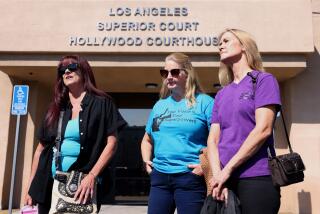Child Advocate Calls for National Website for Tracking Molesters
- Share via
A convicted child molester whose meticulous lists make San Jose police believe he may have sexually abused hundreds of boys might have been stopped by a better system of tracking such predators, the leader of a child-advocacy group said Friday.
“Because these guys can go anywhere and do whatever they want and use various aliases, we need to have a national website,” said Mark Klaas, president of the Klaas Kids Foundation in Sausalito.
Klaas -- the father of Polly Klaas, whose murder by a convicted kidnapper in 1993 led to California’s three-strikes law -- said a national Internet site should be created that lists the crimes committed, a physical description of the offenders, their addresses and their vehicle license numbers.
“If you give people the ability to do that, we can become part of the solution,” he said. “Otherwise, we become guinea pigs in a social experiment that continues to create victims and allow perverts like [Dean Arthur] Schwartzmiller to be recycled through the system time and time again.”
A national database listing sex offenders has been proposed by Sen. Byron L. Dorgan (D-N.D.). His proposal failed to pass last year but he has reintroduced it this year.
Schwartzmiller, 63, was arrested last month in Snohomish County, Wash., where he was believed to have fled after a San Jose couple told police he had molested their 12-year-old son. Detectives said further investigation revealed that Schwartzmiller had also molested another 12-year-old boy in San Jose.
Officers searched Schwartzmiller’s San Jose home, where they said they found seven binders containing the first names of hundreds of boys, often marked with codes that appeared to refer to specific sex acts. Police later arrested Schwartzmiller’s roommate, Fred Everts, who has been charged in connection with at least one of the San Jose molestations.
Police said Schwartzmiller moved from state to state, and to Brazil and Mexico, over a period of 35 years, leaving behind a rap sheet that included repeated allegations of sexual assaults on young boys. Over the years, he pleaded guilty once, no contest once and was convicted at least three times. One of the convictions was overturned.
But despite a California law since 1947 requiring sex offenders released from prison to register with law-enforcement officials, Schwartzmiller apparently never registered, police said. They said that because he used several aliases and was constantly on the move, officers and residents in San Jose were unaware that he was living in their city.
The 1947 law was strengthened in 1996, when California enacted its version of Megan’s Law, named for Megan Kanka, a 7-year-old New Jersey girl raped and murdered by a convicted child molester who had moved in across the street.
California’s law requires serious and high-risk sex offenders like Schwartzmiller to register their names, addresses, criminal records and risk status in cities where they live and work.
Sex offenders like Schwartzmiller who have been convicted of crimes in other states are required to register in California.
But Greg Pagan, chief counsel for the Assembly Committee on Public Safety, said about 20% of the sex offenders in California fail to register.
Two years ago, the U.S. Supreme Court upheld Megan’s Laws and said the registration requirements may be imposed on offenders whose crimes took place in the 1970s and 1980s, years before the laws were enacted in every state.
Under Megan’s Law in California, all the information is available to the public through the Internet or by telephone.
More to Read
Sign up for Essential California
The most important California stories and recommendations in your inbox every morning.
You may occasionally receive promotional content from the Los Angeles Times.













